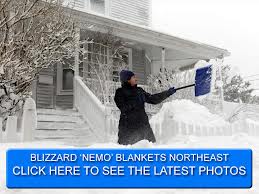3 Reasons Why Global Warming Yields Record Snows

Keeping it simple, there are three reasons that may help you explain the connection.
-
One of the other effects of warming the ocean is to change the pattern of usual currents in atmosphere and oceans. Our typical seasonal weather patterns are greatly affected by such air currents as the Jet Stream that moves air masses in the northern hemisphere from west to east, and ocean currents such the Gulf Stream in the Atlantic, or those ocean patterns altered by El Nino and La Nina in the Pacific.
-
This satellite depiction shows a phenomenon that is happening more frequently in winter — blue indicates colder than normal and red is warmer than usual. The jet stream location changes, moving cold air masses further south. That increases the tendency for the extra moisture to come down as snow rather than rain.
Note the related effect that the Arctic is much warmer than usual, increasing the rate of melting ice that speeds the melting of the floating sea ice around the North Pole, further adding to the positive feedback loop that warms the planet — accelerating the whole phenomenon. (Also the warmer temperature in the polar region speeds the melting of glaciers and the Greenland Ice Sheet, adding to sea level rise.) This is one of those "positive feedback loops" of climate change.
- The other relevant effect is that even the cold temperatures of winter may not be as cold as they used to be a decade ago. When air is very cold it has less moisture capacity. Thus, air masses in the high 20's F, can hold a lot more moisture than really cold air. Combined with the other two phenomena that all go with a warming planet, this adds to record snow potential, such as the present "Nemo."
The bottom line: Not only is a warming planet not inconsistent with record snows, it is exactly what the climate models show can be expected. This highlights the challenge with calling it "global warming" to describe a planet that is warming OVERALL. That is the reason that the phrase "Climate Change" is preferred by many to cover the fact that the planetary warming will be seen as colder air masses in some places, sometimes including record snow. An even better description might be "climate destabilization" (a phrase suggested to me by visionary scientist Sir Crispin Tickell).

 This satellite depiction shows a phenomenon that is happening more frequently in winter — blue indicates colder than normal and red is warmer than usual. The jet stream location changes, moving cold air masses further south. That increases the tendency for the extra moisture to come down as snow rather than rain.
This satellite depiction shows a phenomenon that is happening more frequently in winter — blue indicates colder than normal and red is warmer than usual. The jet stream location changes, moving cold air masses further south. That increases the tendency for the extra moisture to come down as snow rather than rain.